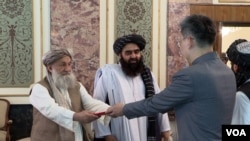China has sent a new ambassador to Afghanistan, marking the first time a foreign envoy has been appointed at the ambassadorial level since the Taliban regained power in Kabul two years ago.
On Wednesday, the Taliban-led foreign ministry said that Prime Minister Mohammad Hassan Akhund had accepted Ambassador Zhao Xing's credentials at a ceremony in the Afghan capital.
Taliban Foreign Minister Amir Khan Muttaqi joined Akhund in welcoming the Chinese envoy at the presidential place.
Beijing did not immediately signal if Zhao's appointment could lead to formal recognition of the Taliban government.
"This is the normal rotation of China's ambassador to Afghanistan and is intended to continue advancing dialogue and cooperation between China and Afghanistan," the Chinese foreign ministry said in a statement. "China's policy towards Afghanistan is clear and consistent."
No government has formally recognized the Taliban since they seized power from a U.S.-backed government in August 2021 when all American-led NATO troops withdrew after nearly 20 years of involvement in the Afghan war.
The international community has been calling on the fundamentalist Afghan authorities to ease restrictions on women's access to education and work before accepting them as the country's legitimate government.
Muttaqi's office quoted him as telling the Chinese ambassador that his appointment is a "significant step, carrying a significant message."
Zhao's predecessor, Wang Yu, assumed the role in 2019 and completed his term last month.
"China respects Afghanistan's national sovereignty, independence and territorial integrity and will never interfere in Afghanistan's internal affairs," the Taliban statement quoted Zhao as telling Muttaqi. It said the Chinese envoy praised the "significant economic progress and improved security" Afghanistan has made in the last two years.
About two dozen countries currently have their embassies in Kabul, run by their senior diplomats using the title “charge d'affaires,” which does not require presenting ambassadorial credentials to the host government.
India, Iran, Pakistan, Qatar, Russia, the United Arab Emirates and Uzbekistan are among the countries that have kept or reopened their diplomatic missions in Afghanistan since the Taliban takeover.
According to diplomatic sources in Kabul, several ambassadors appointed during the now-defunct Afghan government have stayed in Kabul, and some of them are close to finishing their terms.
Analysts say China's security concerns are driving its increased diplomatic engagement with the Taliban to prevent the conflict-torn country from sliding into chaos again, which could encourage anti-China militants to use Afghan soil as a launching pad for attacks against Chinese interests.
Beijing has taken steps to help the Taliban stabilize the Afghan economy and deal with a dire humanitarian crisis. Western nations suspended all financial aid and imposed economic sanctions on the new Kabul rulers after departing the country. Chinese investors have signed significant agreements with Kabul in the Afghan mining and oil sectors.
Skeptics question the viability of these contracts, citing international banking and financial sanctions.
"We don't see Afghanistan as an area for geopolitical competition," Tom West, the U.S. special representative for the country, told a Tuesday seminar in Washington when asked how the United States would look at a potential increase in Chinese investment in the South Asian nation.
"I have no objection to a greater Chinese intervention, and I also don't forecast that one will be forthcoming," West said.
Critics say China is not an advocate of the Taliban’s religious government because it could cause radicalism to flourish in the region.
"China is interested in Afghanistan's security and the potential development of terror groups in its immediate neighborhood," said Torek Farhadi, a senior regional analyst and former Afghan official. "This is why next to the new ambassador, the Chinese military attaché is seated," he said, referring to the photo the Taliban official released after the meeting with Zhao.
"China is making very modest investments in Afghanistan, just to keep open access with the Taliban, but it is not willing to accept a Taliban ambassador-level representative in Beijing. For that, the Chinese have already asked the Taliban to modernize their government," Farhadi said.
Some information for this report came from Reuters.




